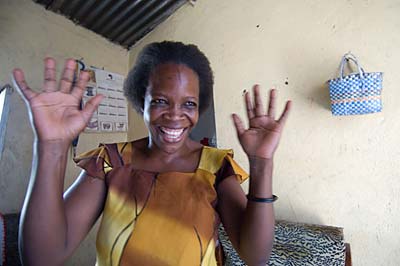 Anti-retroviral therapy re-energizes a Tanzanian woman living with HIV to give back to others who face the same challenges. She is a different woman than she was four years ago—healthy and full of life, thanks to the Catholic Relief charity, and their wealth of HIV services, along with the U.S. government initiative that distributes antiretroviral treatment for millions of people living with HIV…
Anti-retroviral therapy re-energizes a Tanzanian woman living with HIV to give back to others who face the same challenges. She is a different woman than she was four years ago—healthy and full of life, thanks to the Catholic Relief charity, and their wealth of HIV services, along with the U.S. government initiative that distributes antiretroviral treatment for millions of people living with HIV…
Sweeping into her small yard in northwestern Tanzania to welcome visitors, Tausi Rashidi is a different woman than she was four years ago—healthy and full of life. It’s hard to even imagine a time when she measured the remainder of her life in only the smallest blocks of time.
“I was sick, but I didn’t know what I was suffering from,” Tausi explains. “Then one day on the radio I heard people talking about HIV and AIDS, and I decided to go and get tested.”
The results were her worst nightmare. Tausi—like an estimated 7 percent of Tanzania’s 40 million residents—was HIV-positive. Burdened with the enormity of her new status, she barely remembers the walk home from the clinic that day.
“I was so scared,” she says. “I was so distracted I was almost run down by a vehicle on my way home.”
Suffering in Secrecy
Tausi hid her status from her husband and three daughters, fearing the stigma that still surrounds the virus in much of Africa. When she began losing weight and suffering from boils and skin rashes, she sought local herbal treatments for her long list of ailments. But as her health continued to deteriorate, her illness became less easy to hide.
“The neighbors were talking about me,” Tausi recalls. “Pointing fingers at me, saying, ‘She is sick.’ “
After six months of living with her secret, Tausi was losing hope. Then a friend pulled her aside—a day Tausi remembers well. Her friend was volunteering as a provider of home-based care for the Mwanza Outreach Group, a partner of Catholic Relief Services that provides a wealth of HIV services in the Lake Victoria region. Recognizing the signs of HIV in Tausi, her friend suggested that Tausi go and meet the caregivers at the center.
“My reception was very good,” Tausi says. “I didn’t know there were people in the world who could love me like that.”
Through the Mwanza Outreach Group, Tausi began receiving food and potent vitamin supplements. As importantly, she began receiving frequent home visits from volunteers who—among other things—provided emotional counseling, taught her healthful food preparation and shared information about disease transmission.
From Despair to Service
The biggest news came a year later, when Tausi learned she was a candidate to receive the powerful antiretroviral medications then being introduced in Tanzania through the President’s Emergency Plan for AIDS Relief, also known as PEPFAR. This U.S. government initiative now aims by 2013 to prevent 12 million new infections and provide care for an additional 12 million people. Care services include antiretroviral treatment for 3 million people living with HIV and support services for 5 million children who have lost their parents or become vulnerable due to the impact of the virus in their households and communities.
CRS receives PEPFAR funding for numerous HIV projects in Tanzania, including care and treatment through the AIDSRelief consortium, and home-based care and support for orphans and vulnerable children through the Tunajali (We Care) project. These projects involve numerous local partners across the country, including the Mwanza Outreach Group: the organization that enabled Tausi to take advantage of both antiretroviral treatment and home-based care. With support from the volunteers at the center, she began taking the lifesaving antiretroviral medications in February 2005.
Today, you wouldn’t know how much Tausi once suffered. She has completely recovered from the many ailments previously plaguing her and has accepted her HIV-positive status. In fact, she has so much new energy that she joined the squadron of volunteers at the Mwanza Outreach Group, offering her own support to others in the community living with HIV. Asked how she feels now, she doesn’t hesitate to answer.
“I have plenty of peace,” Tausi says. “I am doing fine.”
Photo and story by David Snyder for CRS. David Snyder is a photojournalist who has traveled to more than 30 countries with CRS, including Tanzania. See David’s photojournalism website and learn why storytelling and photos are so important for NGO’s.
(Thanks to Ms. Colwell for submitting the link for publication!)



















